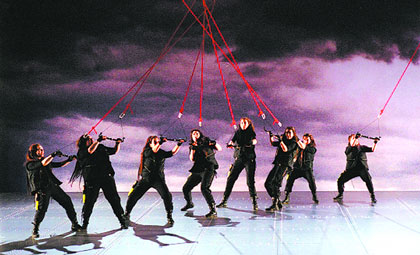Wagner in English provokes and disturbs
A journey to London in lovely May affirmed that sometimes the old things are the best: Richard Wagner’s vision of heaven easily trumped Jerry Springer’s hell.
The gorgeously refurbished Coliseum Theater, all off-white plaster, garnet plush, and brass railings, set off the English National Opera’s stark staging of Wagner’s “The Valkyrie” directed by Phyllida Lloyd (May 29). In the manner of the “Brit Art” movement, this production strips the mythological tale of sentimentality and most of its romance, with the apparent intention of leaving the audience uneasy with the moral complexities presented in the opera.
Instead of a primitive hut built around an ash tree, the separated-at-birth twins Siegmund and Sieglinde meet in a stark public housing flat of poured concrete, their incestuous longing hardly enough to overcome their profound sense of depression and fatigue. The lengthy second act transpires in a sparely furnished artist’s loft where Wotan is literally the architect of his children’s fate––we see a scale model of the set for the first act on his designer’s table. Brunnhilde appears to announce Siegmund’s death in a high-tech vision involving real-time video projection, and the secrets revealed by Erda are stored for retrieval in Wotan’s laptop computer.
But it’s in the third act that Lloyd’s imagination really blooms. In a bracing and grimly funny staging of the “Ride of the Valkyries,” Wotan’s road warrior daughters haul living-dead soldiers down from the sky on blood-red bungee cords. For the long scene of father-daughter moral debate, this production ups the emotional odds by introducing into the action a gurney holding the corpse of Siegmund enclosed in a body bag.
Brunnhilde is not, strictly speaking, put into a magic sleep, but rather restrained by medical technicians and injected with a narcotic. She is then stripped to her underwear and left alone on a city street to be menaced by a leering gang of lads. The final image of the production breaks the heart: Brunnhilde, “guarded” by no more than a few wisps of red smoke, staring blankly as her father strides up the aisle of the theater and out of her life forever.
The production is not flawless. Lloyd’s idea of having Sieglinde “give birth” to the magic sword in silhouette provoked a few snickers from audience members familiar with Austin Powers movies, and the second-act confrontation of Wotan and Fricka was so underplayed as to fall flat.
What I cannot fault is Lloyd’s obvious rapport with her performers. Even when I questioned a given dramatic choice, I bought into their visceral commitment to the emotion of the moment. Here in New York, we’re used to snoozing through the last half-hour of this opera while a by-the-numbers Wotan and an immobile Brunnhilde stare glumly into the orchestra pit. What a revelation, then, to witness singing actors like Robert Hayward and Kathleen Broderick who play this scene as if their lives depend on it.
Enhancing the impact of the drama was the new English translation by Jeremy Sams; yes, actually understanding the words sung does mean more than reading them off an LED screen. Besides comprehensibility, I can’t say this version of the text does Wagner many favors, since Sams reduces the German poetry to banal prose. In Wagner’s original German, Fricka announces, “Heervater harret dein” (“The father of hosts awaits thee”)––a phrase ringing with godly resonance. In the Sams version, she sings, “Wotan will see you now,” which sounds like her next line should be “… and Zeus is holding on line two.”
The closest thing to a world-class voice in this company is Clive Bayley (Hunding), but with only one exception, the singers are all strong and well-cast. The dud is tenor Par Lindskog (Siegmund), who couldn’t find accurate intonation if it were sticking out of the side of an ash tree. Broderick’s dramatic soprano is more utilitarian than glamorous, but she got the job done with only slight evidence of vocal fatigue at the very end of the evening. Orla Boylan’s Sieglinde began unpromisingly with whiny white tone, but warmed up for the big soaring phrases in the last act.
Hayward’s baritone may be one size too small for Wotan (he’s more a Donner/Gunther type), but he wisely took a lyric approach to the role, entirely appropriate to his introspective take on the character. As Fricka, Susan Parry looked every inch the alpha female in her black pantsuit, spike heels, and blond bob, but her plummy mezzo obscured most of her words.
The Valkyries were as strongly cast as you’re likely to find anywhere these days, overpowered only once or twice when conductor Paul Daniel let the brass run riot. The auditorium of the Coliseum seems to favor high frequencies, which may be why the orchestra sounded edgy, even screechy at points. On the other hand, it was a treat to hear such self-effacing and attentive accompaniment to the intimate moments of the opera, quite a contrast to the lugubrious Wagner we know so well here in New York.
After reading unanimous raves about “Jerry Springer: the Opera,” I looked forward to a witty musical satire of America’s king of trash TV. And was I ever disappointed! As seen on May 24 at the Cambridge Theater, the level of wit rarely rose to that of a “Saturday Night Live” skit. The one-joke concept is tipped off in the title: we hear, for example, a countertenor “chick with a dick” shrieking “Talk to the hand!” in mock-Wagnerian hysteria. Later, two characters sing a mock-Handelian duet of elaborate roulades on the text “fuck you.”
Oh, how the audience roared every time anyone said the f-word, which added up to about 500 laughs in the course of the evening. Among the huge cast, the clear standout was David Bedella (Warm Up Man/Satan), a triple-threat star personality with a seemingly limitless vocal range.
James Jorden is the editor of parterre box, the queer opera zine (parterrebox@aol.com).


































